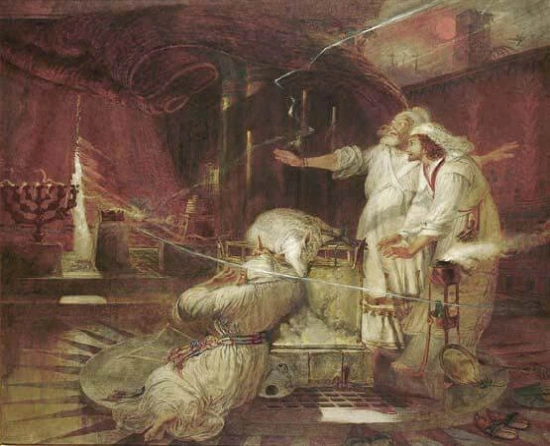586. 13:7 It was granted it to make war with the saints and overcome them. This symbolically means that they attacked the Word's Divine truths and overturned them.
War symbolizes spiritual war, which is a war of falsity against truth, and of truth against falsity (no. 500). To make war, therefore, symbolically means to attack. Saints mean people who are governed by Divine truths from the Lord through the Word, and thus, abstractly from persons, Divine truths themselves (no. 173). Consequently, to overcome the saints means, symbolically, to cause truths not to prevail, thus to overturn them.
The following declaration in Daniel has a similar symbolic meaning, that the fourth beast to come up from the sea, which had a mouth speaking great words, "made war with the saints and prevailed" (Daniel 7:7-8, 21). To be shown that the male goat means faith divorced from charity, see The Doctrine of the New Jerusalem Regarding Faith, nos. 61-68.
The following has a similar meaning:
...a king shall arise, having fierce features, who understands intrigues... He shall destroy the mighty, and also the holy people... He shall even rise against the Prince of princes... He shall cause deceit to prosper under his hand. (Daniel 8:23-25)
The king is the male goat, as said in verse 21.
Very similar is symbolism found in the statement that "the beast that ascends out of the bottomless pit will make war against (the two witnesses), overcome them, and kill them" (Revelation 11:7, and no. 500). They will overcome them because the laity do not see through the clergy's sophistries, which they call mysteries, for the clergy wrap them up in appearances and fallacious reasonings. That is why the people said, "Who is like the beast? Who can fight against it?" (verse 4, and nos. 579-581).
[2] That saints (or holy ones) mean people governed by truths from the Lord through the Word can be seen from the passages cited in no. 173 above, and also from the following:
(Jesus said, "Father,) sanctify them in Your truth. Your Word is truth... ...I sanctify Myself, that they also may be sanctified in the truth... I in them, and You in Me. (John 17:17, 19, 23)
Jehovah came from Sinai..., He came from the ten thousands of the holy; from His right hand came a fiery law for them... All His saints are in Your hand...; each shall receive Your words. (Deuteronomy 33:2-3)
It is apparent from this that those people are called saints who are governed by Divine truths from the Lord through the Word. Moreover, those who live according to the commandments, that is, to the Word's truths, are called the saints or holy people of Jehovah (Leviticus 19:2, Deuteronomy 26:18-19). The Decalogue is the covenant they were to keep (see no. 529 above, and The Doctrine of Life for the New Jerusalem60).
It was for this reason that the place in the Tabernacle where the Ark was, containing the Decalogue, was called the holy of holies or the most holy place (Exodus 26:33-34).
[3] Those people who live according to the Word's truths are called saints, not because they are holy, but because the truths in them are holy; and truths are holy when they come from the Lord in them, and they have the Lord in them when they have His truths in them (John 15:7).
Because of their truths from the Lord, angels are called holy (Matthew 25:31, Luke 9:26). So, too, are prophets, (Luke 1:70, Revelation 18:20; 22:6). And also apostles (Revelation 18:20).
It is because of this that the Temple is called a holy temple (Psalms 5:7; 65:4). That Zion is called a holy mountain (Isaiah 65:11, Jeremiah 31:23, Ezekiel 20:40, Psalms 2:6; 3:4; 15:1). That Jerusalem is called a holy city (Isaiah 48:2; 64:10, Revelation 21:2, 10, Matthew 27:53). That the church is called a holy people (Isaiah 62:12; 63:18, Psalms 149:1), and also a kingdom of saints (Daniel 7:18, 22, 27).
They are called saints because in an abstract sense angels symbolize Divine truths from the Lord; prophets symbolizes doctrinal truths; apostles symbolize the church's truths; and the Temple symbolizes heaven and the church in respect to Divine truth, as do also Zion, Jerusalem, the people, and the kingdom of God.
That no one is holy in himself, not even angels, may be seen in Job 15:14-16. But they are holy from the Lord, because the Lord alone is holy (Revelation 15:4, no.173).








